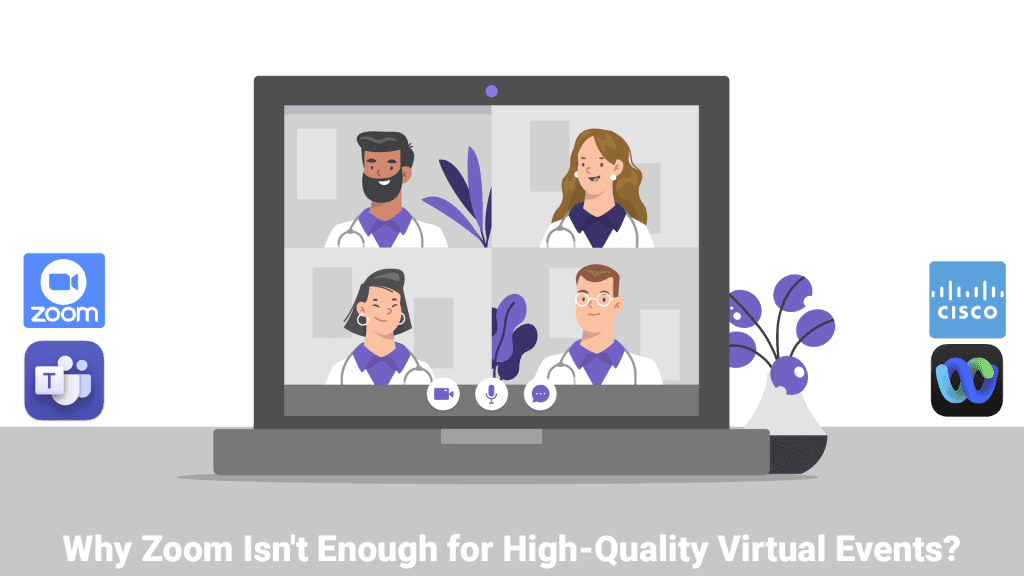
Discover the limitations of Zoom as a virtual event platform and why it is insufficient for hosting high-quality virtual events. Explore the importance of opting for specialized virtual event software that offers scalability, customization, and dedicated event management tools.
In recent times, virtual events have become increasingly popular, enabling individuals and businesses to connect, collaborate, and share information remotely. As the demand for virtual events continues to rise, it is essential to recognize that not all virtual event software is created equal.
While Zoom has gained significant popularity as a video conferencing tool, it falls short in delivering the comprehensive features and customization options necessary for hosting top-notch virtual events. In this blog post, we will explore why opting for the best virtual event software is crucial for ensuring a quality virtual event experience.
Unveiling the Limitations of Zoom: Why it Falls Short for Delivering High-Quality Virtual Events.
Scalability and Customization
Zoom’s primary focus lies in video conferencing, which limits its scalability and customization capabilities when it comes to hosting virtual events.
While it may be suitable for small meetings or webinars, larger and more complex events require a robust virtual event platform that can accommodate a vast number of attendees, interactive sessions, breakout rooms, networking opportunities, and other essential features.
Specialized virtual event software offers scalability and customization options that are specifically designed to meet the diverse needs of virtual events, making it the ideal choice for those seeking a high-quality and tailored event experience.
Dedicated Event Management Tools
Hosting a virtual event involves intricate planning, organization, and seamless execution. Zoom, primarily designed for video calls, lacks dedicated event management tools that are essential for successful virtual events.
In contrast, the best virtual event software provides a comprehensive suite of event management features such as event registration, ticketing, agenda management, speaker and attendee management, branding customization, analytics, and reporting.
These tools empower event organizers to streamline their operations, create engaging experiences, and gather valuable insights to enhance future events.
Engaging and Interactive Features
To captivate attendees and deliver an immersive experience, virtual events require engaging and interactive features beyond simple video conferencing.
While Zoom offers basic chat and screen-sharing functionalities, it lacks advanced features like gamification, live polling, Q&A sessions, audience feedback tools, social media integration, and virtual exhibitor booths.
Incorporating these interactive elements not only keeps attendees actively involved but also facilitates networking, knowledge-sharing, and collaboration among participants.
By opting for virtual event software that offers an array of interactive features, organizers can enhance audience engagement and create memorable experiences.
Branding and Customization Options
Maintaining consistent branding and customization throughout a virtual event is crucial for conveying a professional image and creating a cohesive experience. However, Zoom’s branding options are limited, often providing only basic customization features such as logo placement.
On the other hand, the best virtual event software offers extensive branding and customization options, allowing organizers to tailor the event platform to match their brand identity.
This includes personalized event websites, branded registration pages, custom themes, and customized virtual environments. The ability to create a visually appealing and immersive event space helps establish a strong brand presence and leaves a lasting impression on attendees.
Networking and Collaboration Opportunities
One of the key advantages of attending in-person events is the opportunity for networking and collaboration. While Zoom enables video communication, it lacks the dedicated networking features necessary for fostering meaningful connections among attendees.
To address this gap, Top Virtual Event Software offers features like virtual breakout rooms, matchmaking algorithms, live chat functionality, and networking lounges.
These features simulate the experience of networking at physical events, allowing participants to connect with like-minded individuals, exchange ideas, and form valuable professional relationships.
Security and Privacy
With the increasing prevalence of virtual events, ensuring the security and privacy of event participants and sensitive information has become paramount.
While Zoom has taken steps to enhance security in response to previous concerns, it still lacks the comprehensive security measures provided by specialized virtual event software.
Advanced event platforms prioritize security by offering features such as password-protected sessions, encrypted data transmission, attendee authentication, secure file sharing, and access controls.
Investing in robust virtual event software ensures that confidential information remains protected, instilling confidence among attendees and organizers alike.
Analytics and Data Insights
Gathering data and analytics is crucial for understanding attendee behavior, measuring event success, and making informed decisions for future events. While Zoom provides basic attendance and participation metrics, it lacks comprehensive analytics and data insights features.
On the other hand, specialized virtual event software offers robust analytics capabilities, providing organizers with valuable data on attendee engagement, session popularity, networking interactions, and more.
These insights enable event organizers to assess the effectiveness of their event strategy, identify areas for improvement, and tailor future events to meet attendee preferences, resulting in continuous event enhancement and greater attendee satisfaction.
Technical Support and Reliability
Technical issues can significantly impact the success of a virtual event. While Zoom offers customer support, it may not always provide the level of assistance required for complex virtual events or troubleshooting during critical moments.
In contrast, top virtual event software often comes with dedicated technical support teams experienced in handling virtual events of various scales. They provide prompt assistance, ensuring smooth event execution and minimizing disruptions caused by technical glitches.
Moreover, specialized virtual event software is built to handle large volumes of traffic, ensuring reliability and stability throughout the event, even during peak usage periods.
By choosing virtual event software that offers comprehensive analytics and robust technical support, event organizers can maximize their event’s potential and deliver a seamless experience for attendees, mitigating the risk of technical challenges and gaining valuable insights for future event planning.
Conclusion
While Zoom has emerged as a popular video conferencing tool, it falls short in meeting the diverse needs of hosting high-quality virtual events. To ensure a successful and memorable virtual event experience, it is imperative to invest in the best virtual event software available, like HuddleXR.
These platforms offer scalability, dedicated event management tools, engaging and interactive features, branding customization, networking opportunities, and robust security measures.
By choosing specialized virtual event software, organizers can elevate their virtual events to new heights, delivering immersive experiences and fostering meaningful connections among participants. So, when it comes to hosting quality virtual events, remember that Zoom simply isn’t enough.






